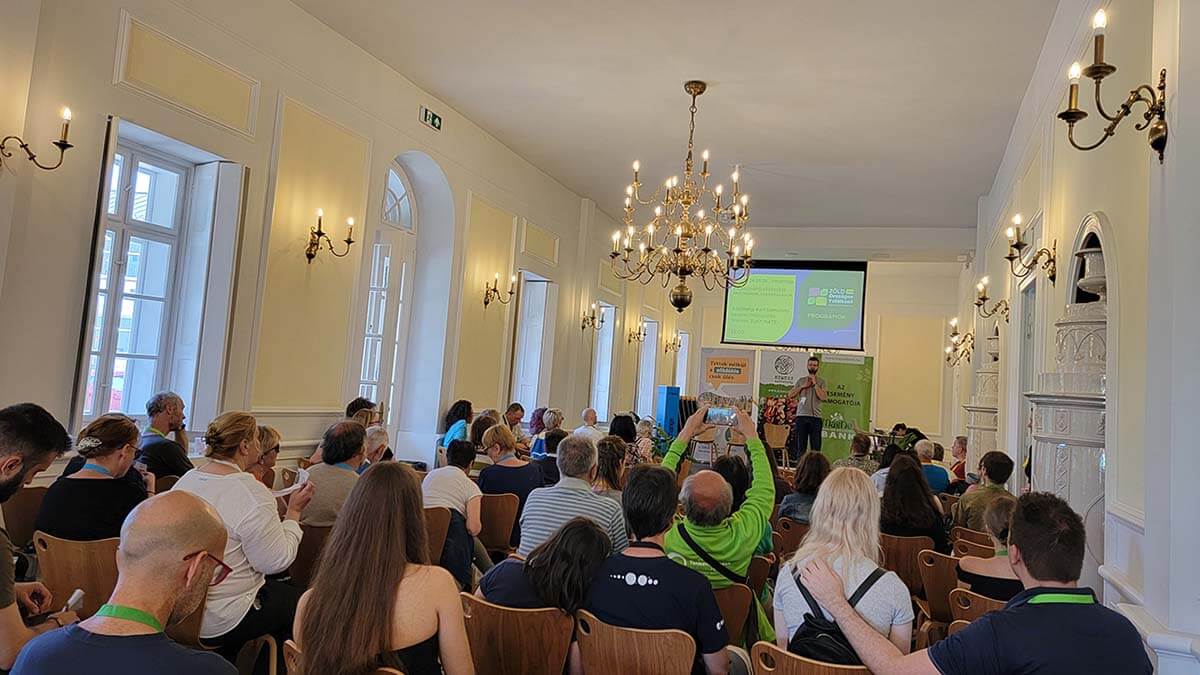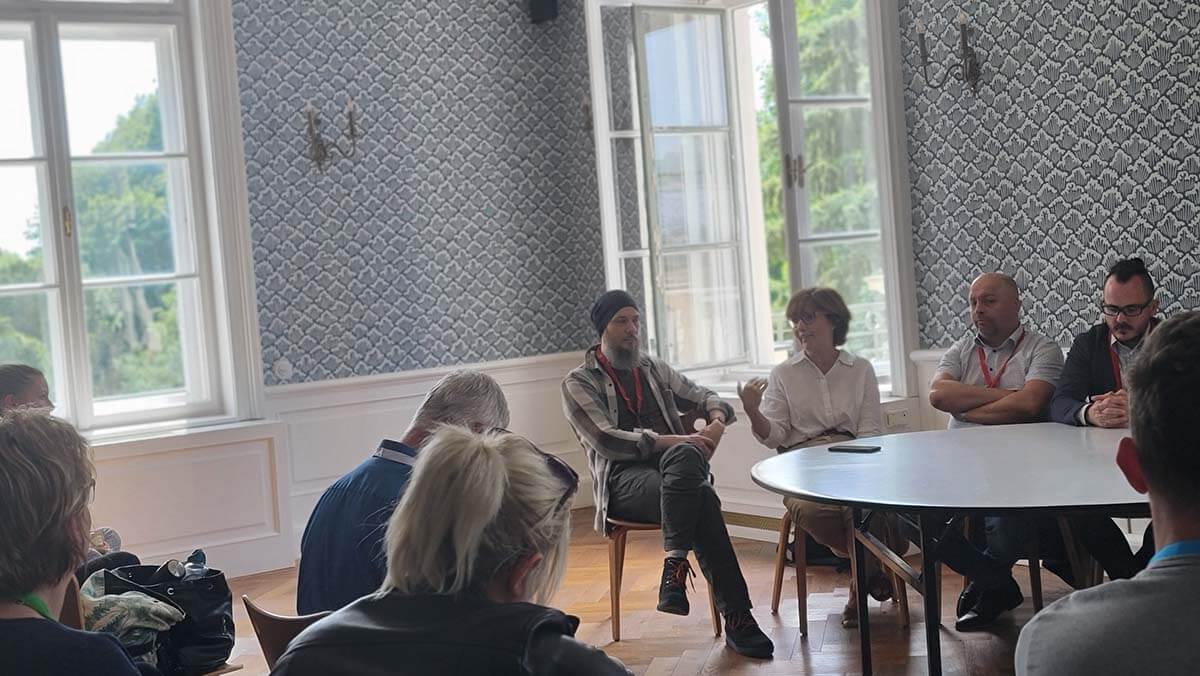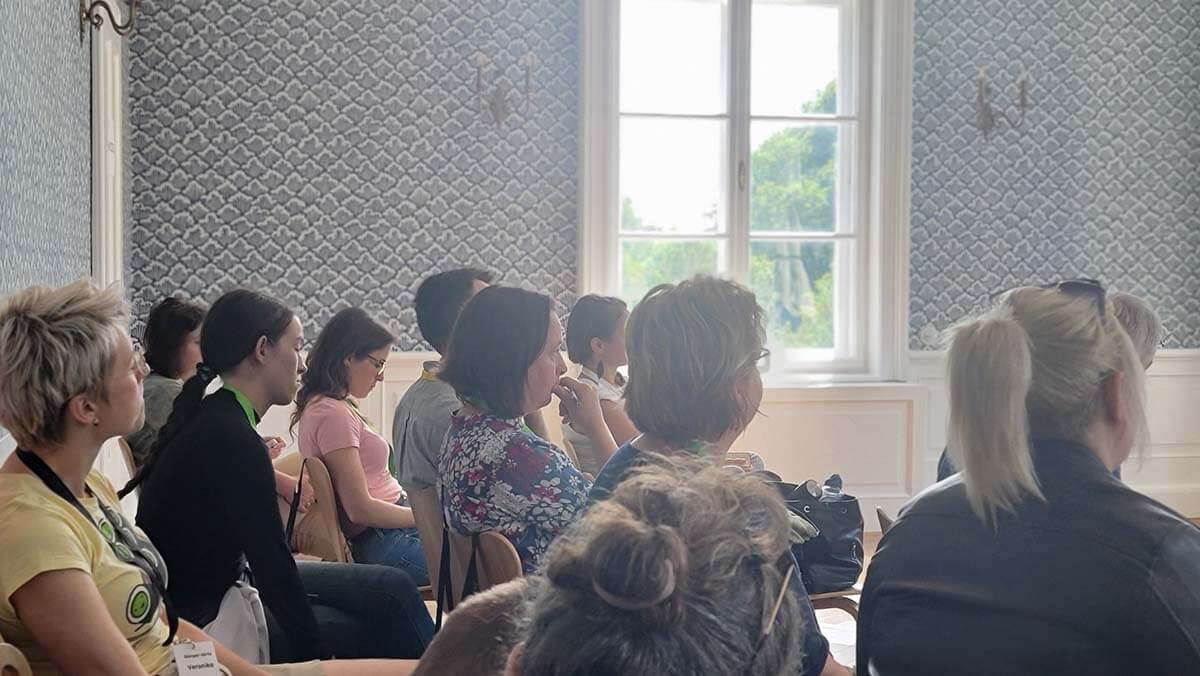
“Without plant-based nutrition, we cannot talk about real environmental and nature protection”
The XXXIII National Meeting of Environmental and Nature Protection NGOs was held in Nagykovácsi, in the Teleki-Tisza Castle, between 24-26 May 2024, in which NÉGYOSZ also participated. The meeting was open to members and activists of any environmental NGO, as well as to anyone who likes green solutions and would like to learn more about conservation issues.
The three-day event included professional forums, capacity-building workshops, and a discussion on zero waste. Other activities included Green Forums, Civil Rapid Dating, Living Library, Environmental Education, Talks, Community Programmes, Theatre, Stand Up, Excursions and a Party.
NEGYOSZ’s programme
We feel that the importance of plant-based diets and the harmful effects of the meat industry have not been given sufficient space in the field of nature conservation, environmental protection and ecology in this country. We would like to change this, to involve NGOs, to initiate a dialogue and to get everyone to start dealing with this issue at their own table and in their own field. This was the aim of our participation in the event, where, in addition to being one of the sponsors, we also organised a round table discussion.
“Without plant-based nutrition we cannot talk about real conservation”

The participants in the discussion were:
- László Bergovecz (MAVEG President),
- Réka Szőllősi, food policy analyst,
- Berezvai Zombor GVH analyst and university professor,
- Gergely Zsolnay, horticultural engineer, vegan chef, ex-hunter,
- Ervin Nagy, NÉGYOSZ president, sustainability and food industry technician, ex-animal breeder and ex-butchery trainee,
- István Miskolczi, CEO of NÉGYOSZ.
Data and tradition
Based on FAU Analysis, Our World Data and KSH data, we discussed how much Hungary’s meat consumption and production has increased over the past 20 years, and how this has affected, for example, the supply of drinking water.
It was said that, for example, Hungarians often refer to tradition in their eating habits, but if we really look into the history of Hungarian gastronomy, we find that our ancestors did not have a meat-based diet, but a grain-based diet. Getting closer to nature and returning to our roots would solve many problems in the environmental and health aspects of nutrition (since various food allergies have not developed by chance).
István Miskolczi added that the human population will peak by 2080, with around 10-10.5 billion people. Whatever the tradition was 100 years ago, 500 years ago, 1000 years ago, it is not certain that we will be able to sustain that many people on Earth today, using the same methods that the Earth has used to serve a tenth of that number.

35% of the environmental footprint is linked to the production of food of animal origin
Ervin Nagy drew attention to the fact that if we look at this event, which has just taken place, during the opening ceremony, and in relation to the climate crisis, there was no mention of this kind of moderation in any of the speeches, even though 35% of the environmental footprint is linked to the production of food of animal origin. When it came to prioritising what we ourselves can do to curb climate change, transport or recycling came up in several places, but nutrition was not mentioned. “Less meat” came up in one sentence, but the proportion of nutrition or the percentage of the climate situation affected, the future of biodiversity, the influence of land use on climate change were not mentioned. There is no mention of not consuming 1 litre of milk every day, not eating a burger with meat, not always having stew on the table at home, but switching to pulses and grains, which ‘replace’ in protein and taste what our grandmothers used to eat.
So the big question is whether we as citizens at the green meeting accept that this is a fact,
and it’s not an extreme way of thinking.
NÉGYOSZ encouraged all those present, through their organisations, to pass on this message to those their voice reaches. But they should also take these thoughts to their children and family members, and nowadays, if you are invited to any event, it is worth speaking up to have a vegetable meal.

Sustainable food on the agricultural policy table?
Réka Szőllősi said that she has tried to put this topic on the table of agricultural policy, but in her experience it is very difficult to get agriculture and agricultural policy to start dealing with the sustainability of food production, and not just cherry picking certain interest groups or topics (e.g. precision farming).
Instead of getting into detailed debates, we need to unite here in Hungary to create a more sustainable food supply, because unfortunately we cannot expect our leaders to do this – this is clear from the past decades.
How can we ensure that when we elect politicians, for example now in the EP elections, we ask them whether they have a vision for making our food supply more sustainable? There is a lack of fundamental social discourse, which is the reason why people are putting their food last. We should not wait 10 years late to start debates and discourses that have already been held elsewhere. We should be thinking about how this issue can be addressed in a synergetic way, from the bottom up.

There has also been talk of lowering the VAT rate on sustainable food, but there is always something that prevents this decision from being taken. However, it is also true that VAT reductions may not be passed on to consumers through the underfunded sectors, or there may be only a short period of consumer price reductions, before reverting back to previous levels. It is important to get this area right.
In addition, when we buy a plant-based product that is also used by the livestock industry, such as wheat or maize, we are financing the livestock industry’s EUR 23 billion deficit. In the same way, when we buy an oat’s milk with a VAT rate of 27%, the VAT paid is financing the dairy industry’s 5% VAT loss.
Meat substitute alternatives and health
Is it a meat substitute for a stew if it is made from mushrooms rather than beef? Or is it only a meat substitute if you are looking for a similar product to replace a familiar taste and texture, such as a vegan sausage, vegan nuggets or veggie burger patties? These substitutes are often filled with ingredients that are questionable as to whether they are bad for your health.
Ervin Nagy said that NEGYOSZ is preparing a health-only comparison study. A researcher from the University of Pécs will be asked to collaborate in the next year. The expert will investigate how much healthier or unhealthier a plant-based alternative is compared to a meat alternative. International data is already available to show that, overall, it is not unhealthier, in fact it is. But they are still processed foods, and their continued consumption is not recommended, just as processed meat products are not recommended.
István Miskolczi drew attention here to the fact that apples should be compared with apples, i.e. vegan salami should not be compared with home-grown chicken. Even so, he doubts that the ratio would not be better in favour of meat, but it is certainly not a good comparison. If you look at a processed meat product, it will have the same level of stock improvers and preservatives as a processed vegetable product, but with the addition of pharmaceutical residues and antibiotic derivatives, which is true for dairy, eggs and meat products.

How much of what you consume is also important. We eat less meat alternatives than meat consumers eat meat products, precisely because there are lentils, mushrooms and many other ingredients that can be used. People who ate meat every day when they switched to a plant-based diet generally eat meat alternatives no more often than 1-2 times a week, but there are many people who eat meat alternatives less often or not at all. So the comparison should also take into account that the volume is different.
However, Gergely Zsolnay added that vegan ready-made products are not for our health, that is not their purpose. For him, as a chef, it is a meat substitute to make a beetroot steak from a beetroot, a cauliflower steak from a cauliflower, or to cook a mushroom stew or bean stew. According to him, the experience in large kitchens is that consumers demand these processed meat imitation products because they are familiar with these textures, aromas and flavours and they are linked to a set of habits. And changing health attitudes in eating habits is extremely difficult.